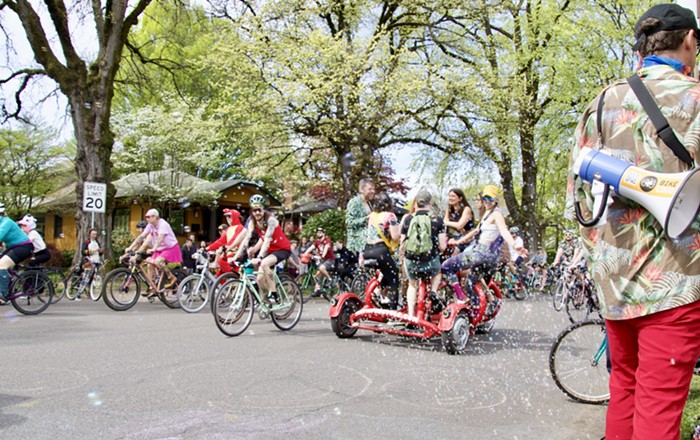A bike sharing program is one of those interesting ideas that rears its eco-green-sustainable head frequently in Portland. Imagine if there were hundreds of bikes locked downtown that office dwellers, students and tourists could check out and ride a few miles for a few dollars. It could be a way to get new people on bikes and reduce car traffic, it could be an expensive clusterfuck. But either way, the city is looking into the scintillating idea. Today the Portland Bureau of Transportation presented its exploratory plans and answered questions during a lunchtime meeting. Here’s the quick basics: 
Didn’t we already try this “socialist bike” thing a while ago? Back in 1995, a grassroots Portland bike-sharing program called the Yellow Bikes Project sprang up with the Community Cycling Center as a sponsor. The Yellow Bikes group aimed to bring 1,000 bright bikes to Portland’s streets, allowing anyone to pick up and ride the bikes around town for free. Rumor has it that there are still yellow bikes to be found at the bottom of the Willamette, mostly under bridges.
What’s different about this idea? The program Portland is exploring wouldn’t be free, to ride the bikes you would pay to subscribe to the bike-sharing program. If the bike disappears on your watch, the program could bill your credit card.
Do other cities have a similar system? Paris has the world’s largest bike-sharing system, with 20,000 shared bikes locked every 300 meters throughout the city. Lyon, Barcelona and Montreal all have between 3,000-6,000 shared bikes on their streets. Stateside, Washington D.C. is the most prominent bike sharing city, but it only has 120 bikes. Seattle is in about the same planning stage for a bike sharing system as we are.
What about tourists who don’t wear helmets and would die on the MAX tracks? That’s a big problem. Some of the cities, like Barcelona, actually discourage tourists from using the shared bikes. While it would be fit nicely into Portland’s "branding," Portland could make the program just for locals, too. It’s worth noting, though, that in Paris the rate of bike crashes has decreased as bike ridership increases.
So…. What kind of cost are we talking about? Steve Hoyt-McBeth of the Portland Bureau of Transportation estimated a $2.64 million start-up cost for a Portland program of 660 bikes.
More Q&As below the cut.
How are we going to pay for that? Cyclists never pay anything! Even taxes! Advertisements on bike racks and benches pay bike sharing programs throughout Europe, but that probably wouldn’t work in Portland because the city bans ads on transit furniture downtown. Barcelona pays for its system from parking and auto fees, Denver funds its system with public money and grants. Everywhere, paid subscribers cover most of the program costs.
Don’t people steal the bikes? Yep. In Paris, thirty percent of the original bike fleet has disappeared or been destroyed by vandals. Washington D.C. has a better success rate with a more advanced locking system, but it’s still an issue.
Where would Portland’s shared bikes live? Mostly downtown, probably. PBOT thinks the best place to put the bikes are in high density, high employment areas.
When could this happen? Who the hell knows. But there will be bike-sharing demos at the Waterfront on August 14th from 10:30-3pm. We’ll see what happens after that.













